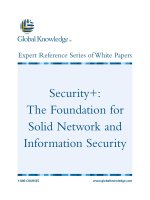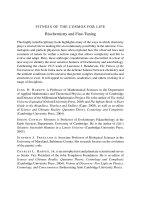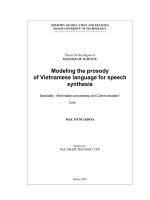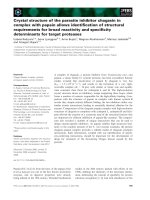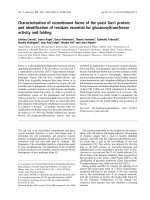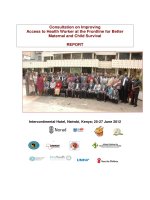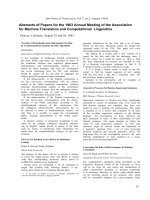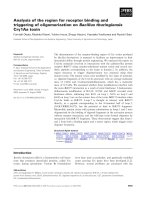The Significance Of The Language For Accounting Theory And Methodology
Bạn đang xem bản rút gọn của tài liệu. Xem và tải ngay bản đầy đủ của tài liệu tại đây (1.3 MB, 268 trang )
University of Wollongong Theses Collection
University of Wollongong Theses Collection
University of Wollongong
Year
The significance of language for
accounting theory and methodology
Ahmad Nasseri
University of Wollongong
Nasseri, Ahmad, The significance of language for accounting theory and methodology , PhD thesis, School of Accounting and Finance, University of Wollongong, 2007.
/>This paper is posted at Research Online.
/>
The Significance of Language for
Accounting Theory and Methodology
A thesis submitted in fulfilment of the requirements for the award of the degree
Doctor of Philosophy
From
University of Wollongong
By
Ahmad Nasseri
B.A. in Accounting (University of Mazandaran, Babolsar, Iran)
M.A. in Accounting (University of Tarbiat Modarres, Tehran, Iran)
School of Accounting and Finance
2007
Dedicated to Akram,
My Beloved Wife,
For Her Patience
II
The Significance of Language for Accounting Theory and Methodology……………….........................…...Certification
Certification
I, Ahmad Nasseri, declare that this thesis, submitted in partial
fulfilment of the requirements for the award of Doctor of Philosophy, in the
School of Accounting and Finance, University of Wollongong, is wholly my
own work unless otherwise referenced or acknowledged. The document has
not been submitted for qualifications at any other academic institution.
Ahmad Nasseri
1 February 2007
III
The Significance of Language for Accounting Theory and Methodology...........................................................Abstract
Abstract
The significance of language for accounting theory and methodology is
investigated and discussed through three different approaches. First,
linguistic analyses of accounting language declare that some difficulties and
misunderstandings in accounting are grounded in language and linguistics.
The relevance of linguistics to accounting is examined through analysing a
number of Iranian accounting terminology cases (e.g. hesaabdaaree,
sarghoflee, etc.). It is shown that improving accounting theory and practice
necessitates considering its linguistics. The linguistic significance of language
on accounting is that, without considering language and linguistic problems,
misunderstandings and difficulties are drawn into accounting. Translation,
ambiguity, and acronyms are introduced as the most effective linguistic
problems that produce difficulties within accounting.
Secondly, philosophical investigations reveal that identifying accounting [as
well as any other human knowledge] is entirely related to language. A
philosophical foundation is established through criticising Frege’s definition of
thought, idea, truth, and falsity. It is argued that truth and falsity, contrary to
what Frege argues, have different natures and thus different methods of
inquiry. It is explained how the dangerous similarity of truth and falsity is a
matter of language and how language trammels true meaning and false
meaning into the same trap. The philosophical criticism results in a
multidimensional explication of accounting. The three main dimensions of
accounting are empirical, critical, and hermeneutical accounting. The singular
definitions, generalisation, and boundary presumptions of accounting theory
are consequently criticised.
Finally, hermeneutical accounting is studied historically to explore the
presence of language in accounting. Hermeneutics has found several
different readings through time. The implications of divergent readings of
hermeneutics in accounting are examined through reviewing the accounting
literature. It is revealed that very few accounting contributors have so far
IV
The Significance of Language for Accounting Theory and Methodology...........................................................Abstract
considered the interpretive aspect of knowledge. The few hermeneutical
explanations of accounting which do exist nevertheless, declare that
accounting is a text which requires interpretation.
This thesis totally adds value of the existing body of accounting theory by
introducing and examining linguistic problems that cause difficulties and
misunderstandings within accounting, analysing two problematic cases of
Iranian accounting terminology and thus evidencing the relevance of a
linguistic approach to accounting, explaining the dangers and difficulties
arising from acronyms within accounting, criticising Frege’s philosophy and
concluding that true thoughts are different in nature and method of inquiry
with false thoughts and then discussing that accounting and all human
knowledge as they are intended to be true thoughts but not false ones are to
be discovered and not created, identifying accounting as a multidimensional
knowledge, and finally explaining the hermeneutical dimension of accounting
through an historical analysis. The thesis entirely approaches empirical,
critical, and historical analyses to announce that language plays a crucial role
in theorising and practicing accounting. It is evidentially emphasised that
dismissing language and linguistic problems of accounting weakens
accounting theory and methodology.
V
The Significance of Language for Accounting Theory and Methodology...........................................Acknowledgement
Acknowledgement
First of all, I would like to express my deep sense of gratitude to my supervisor,
Professor Michael Gaffikin, for his friendly encouragement, scholarly
guidance, continuous support, and rigorous inspiration without which the subject
of this thesis would have never come to my mind and would have never matured
into a research proposal. I will never forget his unbelievable tolerance in facing
my bare and raw questions. His incredibly kind behaviour lifted me even to the
extent of criticising him. This is what is generally called ‘academic’ behaviour
here, but, I feel, worthy enough to be transferred as the PhD experience to my
home country. Thank you Michael and thank you Australia for this valuable
experience and for every thing I did not have before visiting you.
I am also thankful to Professor Warwick Funnell, Professor Christopher
Poullaos, and Associate Professor Mary Kaidonis of the academic staff of
School of Accounting and Finance of University of Wollongong, for their
considerable support and consistent attentiveness to my questions. In addition,
thank you to Professor Barbara Merino and Professor Alan Mayper (of the
University of North Texas) both of whom invested remarkable time assisting me
with the development of my questions during their short residence in
Wollongong University. Thank you all for your selfless attention.
Dr. Michael Jones and his respectful wife Valerie have paid remarkable and
uninterrupted attentions to my academic and non-academic requirements.
Giving a written thanks to them is the least I have to do in response to their kind
and valuable assistance. With a friend as such as Michael, I never felt alone in
doing this research.
At the time of submitting, I noticed that the editor of this thesis who has
obscurely given the majority of my writings a readable shape in association with
Professor Gaffikin is his respectful wife, Mrs. Angela Gaffikin. I can only imagine
how boring and noisome my writing must have been to her. I cannot find words
to express the depth of my gratitude to her. I hope one day that I will have an
opportunity to return my gratitude to her in return for her selfless donation of
time, effort and skill for me.
VI
The Significance of Language for Accounting Theory and Methodology...........................................Acknowledgement
Mr. David Aylward, Mr. Dean Trifunovich, Mr. Laszlo Abel, Ms. Cynthia
Nicholson, Ms. Maree Horne, Mrs. Allison Hill, and other staff of Faculty of
Commerce have considered my requests in relation to their job. They have been
kindly effective in improving this research experience. It is not fair to forget their
attempts at the time of closing this file. Thanks to them all.
My wife, Akram has provided me with continuous support during this difficult
time. In addition to all general difficulties an overseas PhD student produces for
his wife, Akram has devoted remarkable attention to my research topic. She has
played the role of a professional audience to my lectures on this research. Her
questions and criticisms have been more than what is expected from a young
theologist. All her kind attentions and her encouragements cause me to dedicate
this thesis to her even though this dedication would never be enough to express
by true regard for her support.
My beloved children, Mohammad and Fatemeh, suffered from my decision to
travel overseas to do a PhD. They have been distressed and deprived for all
these long years. They have lost golden opportunities of visiting with
grandparents, uncles, aunts, cousins, and all other relatives. They have also lost
the opportunity to improve their native language, Persian, even though as a
result they have flourished in English. This might be ranked as a part of PhD
cost or a subsidiary benefit of it. Good or bad this journey has had an indelible
effect on their future, and I should apologise for any unknown affects in advance.
My father, who died when I was thousands of kilometres far away from him last
year, was really the first to encourage me along this path. May Allah reward him
with graces and blessings for his virtuous paternity. My beloved mother, mother
in law, father in law, brothers, brothers in law, sister, and sisters in law have also
done their best in encouraging and helping me to travel overseas for this stage
of my academic life. Without their help and encouragement I could not sit relax
and write this thesis. I hereby express my formal appreciations to all of them.
May Allah reward them all with the best here and hereafter.
VII
The Significance of Language for Accounting Theory and Methodology............................................Table of Contents
Table of Contents
Certification ...................................................................................................III
Abstract ........................................................................................................ IV
Acknowledgement ....................................................................................... VI
Table of Contents....................................................................................... VIII
List of Figures ............................................................................................. XII
CHAPTER 1.
INTRODUCTION ....................................................................1
1.1. Commencement........................................................................................1
1.2. Key Words ................................................................................................2
1.3. The Aim of Research ................................................................................2
1.4. The Structure of the Thesis.......................................................................3
1.5. Methodology ...........................................................................................12
1.6. Literature Review ....................................................................................12
1.7. Penglish ..................................................................................................14
CHAPTER 2.
LANGUAGE AND LINGUISTICS .........................................15
2.1. Introduction .............................................................................................15
2.2. General Systems Theory ........................................................................16
2.3. Systems Thinking...................................................................................22
2.4. Systems Thinking Language...................................................................25
2.5. Language as a System ...........................................................................30
2.5.1. Functions ........................................................................................31
2.5.2. Structure .........................................................................................35
2.5.3. Interactions .....................................................................................36
2.5.4. Language Variation and Change ....................................................41
VIII
The Significance of Language for Accounting Theory and Methodology............................................Table of Contents
2.5.5. Language is Purposeful ..................................................................43
2.6. Globalisation and Language ...................................................................45
2.7. Language Forms.....................................................................................49
2.8. Word and Meaning..................................................................................49
2.9. Linguistic Problems.................................................................................52
2.9.1. Ambiguity........................................................................................53
2.9.2. Translation......................................................................................55
2.9.3. Acronyms........................................................................................57
2.10. Language Disciplines ............................................................................62
2.10.1. Linguistics.....................................................................................62
2.10.2. Philosophy of Language ...............................................................64
CHAPTER 3.
A LINGUISTIC APPROACH TO ACCOUNTING .................67
3.1. Introduction .............................................................................................67
3.2. Literature Review ....................................................................................68
3.2.1. Linguistic Studies in Iranian Accounting Literature .........................68
3.2.2. Linguistic Studies in English Accounting Literature ........................74
3.3. The Purpose of this Chapter ...................................................................87
3.4. Linguistic Problems of Iranian Accounting ..............................................89
3.4.1. Hesaabdaaree ................................................................................89
3.4.1.1. A Localistic Lexical Semantic Approach ........................................... 90
3.4.1.2. A Holistic Lexical Semantic Approach .............................................. 92
3.4.1.3. Conclusion ........................................................................................ 96
3.4.2. Sarghoflee ......................................................................................98
3.4.3. Bedehkaar and Bestaankaar ........................................................107
3.4.4. Accounting and Acronyms ............................................................107
3.5. Conclusion ............................................................................................112
IX
The Significance of Language for Accounting Theory and Methodology............................................Table of Contents
CHAPTER 4.
A PHILOSOPHICAL ASPECT OF LANGUAGE, THOUGHT
AND ACCOUNTING....................................................................................113
4.1. Introduction ...........................................................................................113
4.2. Language and Thought .........................................................................116
4.3. Thoughts and Dreams ..........................................................................120
4.3.1. Ambition is the Death of Thought .................................................124
4.4. Thinking ................................................................................................126
4.5. The Development of Accounting Thought .............................................129
4.6. Lingual and Non-Lingual Disagreements ..............................................149
4.7. Generalising and Boundary Assumptions .............................................153
4.8. Accounting is Multidimensional .............................................................154
4.9. A Knowledge Classification...................................................................156
4.10. Termination .........................................................................................160
CHAPTER 5.
AN HISTORICAL VIEW OF HERMENEUTICAL
ACCOUNTING ............................................................................................163
5.1. Introduction ...........................................................................................163
5.2. Hermeneutics........................................................................................165
5.2.1. Definitions.....................................................................................166
5.2.2. Historical Development.................................................................168
5.2.2.1. Religious Hermeneutics .................................................................. 169
5.2.2.2. General Hermeneutics .................................................................... 170
5.2.2.3. Methodological Hermeneutics......................................................... 170
5.2.2.4. Philosophical Hermeneutics ........................................................... 171
5.2.2.5. Ontological Hermeneutics............................................................... 172
5.2.2.6. Critical Hermeneutics...................................................................... 172
5.2.2.7. Reception Hermeneutics ................................................................ 173
5.2.3. The Contemporary Battle..............................................................174
5.2.3.1. Post-Modern Hermeneutics ............................................................ 176
5.2.3.2. Critics of Post-Modern Hermeneutics ............................................. 178
5.3. Hermeneutics of Accounting .................................................................181
X
The Significance of Language for Accounting Theory and Methodology............................................Table of Contents
5.3.1. Modern Hermeneutics of Accounting............................................182
5.3.2. Post Modern Hermeneutics of Accounting....................................187
5.3.3. Critical Hermeneutics of Accounting .............................................200
5.3.4. Reception Hermeneutics and Accounting.....................................201
5.4. Conclusion ............................................................................................202
CHAPTER 6.
CONCLUSION....................................................................205
6.1. Introduction ...........................................................................................205
6.2. Summary...............................................................................................206
6.3. Contributions.........................................................................................211
6.4. The Limitations of This Research..........................................................215
6.5. Proposed Research ..............................................................................216
Bibliography ...............................................................................................219
Appendix 1: English Acronyms in Persian Scripts.................................243
Appendix 2: Persian Letters and Phonemes ...........................................244
Appendix 3: A Selected List of the Combinations of the Suffix Daaree 246
XI
The Significance of Language for Accounting Theory and Methodology.................................................List of Figures
List of Figures
Figure 2-1 The Hierarchy of Systems Complexity...................................... 19
Figure 2-2 HIPO Diagram .......................................................................... 20
Figure 2-3 A Simplified View of Systems' Hierarchical Structure ............... 22
Figure 2-4 A Simple Road Network............................................................ 23
Figure 2-5 The Main Conceptual Sub-Systems of Human Beings ............. 37
Figure 2-6 Constraints of the Meanings of a Word..................................... 50
Figure 2-7 Language strata........................................................................ 63
Figure 4-1 Types of Theories ................................................................... 139
XII
The Significance of Language for Accounting Theory and Methodology……….………………..Chapter 1. Introduction
Chapter 1.
Introduction
The limits of my language mean the limits of my world.
Ludwig Wittgenstein
1.1. Commencement
If the congruity of accounting and language which is frequently
expressed as “Accounting is the Language of Business” is at all real, and if
as Wittgenstein (1961) says, the limits of one’s language mean the limits of
his/her world, then the limits of accounting mean the limits of business. It is
consequently concluded that to improve business, accounting should be
essentially improved. On the other hand, accounting, as a socially
constructed system, is entirely linked to language as well as culture, history,
and thought. The circular chain of improvement comes back to language,
particularly the language of accounting. That is, to philosophise, improving
accounting language would result in improvements in accounting and hence
1
The Significance of Language for Accounting Theory and Methodology……….………………..Chapter 1. Introduction
business. This research is commenced with aiming to introduce the lingual
perspective of accounting to examine the significance of language in
developing its theory and methodology.
1.2. Key Words
Accounting, Accountancy, Theory, Practice, Methodology, Empirical,
Critical, Hermeneutical, Historical, History, Multidimensional, Plural, Singular,
Positive, Normative, Thought, True, False, Language, Linguistics, Iranian,
Persian, Goodwill, Translation, Ambiguity, Acronyms, Word, Meaning,
Systems Thinking, General Systems Theory, Knowledge, Understanding,
Misunderstanding, Interpretation, are the most relevant terms to this thesis.
1.3. The Aim of Research
As entitled, this thesis aims to explore the significance of language
for accounting theory and methodology. The main concern is that if and how
language appears in accounting. The presence of language in accounting is
studied through three approaches. Each argument establishes particular
sorts of supporting evidence to show that language is significant in
accounting. The first argument follows a linguistic approach to see if and how
linguistic problems affect the way accounting is theorised, regulated,
standardised, taught/learnt, practiced, interpreted and understood. It is
sought to see how a linguistic problem produces difficulties and
misunderstandings in accounting regulation, education, profession, etc. and
to examine the relevance of a linguistic approach to accounting. The second
argument is formed to see if and how accounting thought is interrelated to
2
The Significance of Language for Accounting Theory and Methodology……….………………..Chapter 1. Introduction
language theoretically. This philosophical argument is based on Frege’s
thought while making a specific criticism of it. Through this argument the aim
is to discuss how accounting [as well as any human thought] is not
identifiable without language. The third argument approaches a specific
aspect of accounting within which language plays the first role. This
argument is organised to see how accounting is a text and hence a subject of
interpretation to support the main aim of the research, the significance of
language.
1.4. The Structure of the Thesis
The structure of the thesis or the sequence of arguments is illustrated
to explain how the three different approaches result in supporting the main
aim of the research. This thesis is organised in six chapters. The current
chapter is an introduction to the whole thesis. The last chapter, chapter 6
presents a conclusive summary of the whole arguments and examinations.
The other four chapters construct the body of thesis. Chapter 2 provides a
theoretical background for identifying accounting and language through a
systemic approach. Chapter 3 focuses on some cases of linguistic problems
of Iranian accounting and shows that some of the misinterpretations and
misunderstandings in accounting are rooted in language. Chapter 4
establishes a philosophical argument to show that language and thought are
entirely interrelated to each other. The last part of the body text, chapter 5
presents an historical study of the interpretive aspect of accounting to see if
and how hermeneutics is implicated in accounting. Under the banner of the
thesis’ structure, a short description of each body chapter (i.e. chapters two
3
The Significance of Language for Accounting Theory and Methodology……….………………..Chapter 1. Introduction
to five) of the thesis is provided to see how the body chapters are related to
each other, and also to suggest the sequence of reading the whole work.
Chapter 2 establishes a theoretical process to identify accounting
and language through a systems thinking approach. It argues that the
systems thinking model results in a more spacious understanding of the
cosmos in comparison with its precedent schools of thought because of its
holistic foundational sense. A brief explanation of General Systems Theory is
illustrated in section 2-2 and then Systems Thinking is explained in section 23. It is argued through section 2-4 that to understand a system, Systems
Thinking Language should be employed. Functions, structure, interactions,
and all major characteristics of ‘language’ are explained through implicating
the systems thinking approach in section 2-5. It is shown that language is
entirely a system belonging to the highest levels of complexity. Chapter 2
also criticises ‘globalisation’ in its modern sense, establishing a unique
language for all people. It is argued that globalisation (in this sense) is neither
possible nor beneficial (section 2-6). And finally the interaction of ‘word’ and
‘meaning’ is explained illustratively in section 2-8.
Chapter 2 continues with section 2-9 by introducing some linguistic
problems that produce difficulties within human communications. ‘Ambiguity’,
‘translation’, and ‘acronyms’ are enbolded as three problems which are either
inherent in or obviously intertwined with language. These issues are explored
for their influences on accounting theory and practice. It is hypothetically
presumed that these sorts of linguistic problems produce misinterpretations
and misunderstandings when they are drawn into accounting. The last
4
The Significance of Language for Accounting Theory and Methodology……….………………..Chapter 1. Introduction
section of chapter 2 (section 2-10) describes how language can be studied
through two academic disciplines. Linguistics and Philosophy have their
particular concerns and particular methods of inquiries in evolving with
language. Chapter 2, therefore, presents a theoretical background for the
following chapter. Chapter 3 is heavily dependent on chapter 2, as it is a
linguistic approach to accounting. The fundamental idea of implicating the
systems thinking approach in understanding the world and its components is
however considered through the whole thesis.
Chapter 3 is organised to examine the relevance of linguistics to
accounting. It comes in two main parts; first an historical background of
linguistic studies in the realm of accounting is provided, and then a number of
linguistic cases of Iranian accounting are analysed. The chapter is totally
concerned with evidence to emphasise the significance of language for
accounting theory and practice. A brief description of chapter 3 shows that it
is obviously successful in supporting the aim of the research.
The section 3-2 of chapter 3 reviews the linguistic studies in
accounting literature. It is divided in two subsections; the first one (section 32-1) provides a complete list of all linguistic [published] research works of
Iranian accounting literature. It is found that very few people have
academically studied accounting through a linguistic approach in Iran to date.
The few published works are however reviewed in order to [at least] protect
the research of repeating findings of previously published works. The other
subsection of the literature review (3-2-2) focuses on linguistic studies in the
English accounting literature. It shows that language and linguistics are
5
The Significance of Language for Accounting Theory and Methodology……….………………..Chapter 1. Introduction
among the most universally considered research subjects by accounting
contributors. The poverty of linguistic studies within Iranian accounting
literature increases the motivations of the researcher to emphasise practice
through some linguistic case studies throughout chapter 3.
The second part of chapter 3 applies linguistics to accounting
practically. First, in section 3-4-1 the word hesaabdaaree which is the
Persian equal of ‘accounting’ and ‘accountancy’ is analysed through two
lexical
semantic
approaches.
A
localistic
lexical
semantic
analysis
determines the meaning[s] of a word in accordance to its structure. It is
presumed in this approach that the meaning of a word is constructed of the
meanings of its parts. A holistic lexical semantic approach determines the
meaning[s] of a word through analysing its position in the network of word
families. The meaning of a word in this view is entirely related to the meaning
of many other words in a network of relations. The both localistic and holistic
lexical semantic analyses show that the word hesaabdaaree fails to
completely cover all the meanings and senses of ‘accounting’. In other
words, hesaabdaaree does not precisely represent the meanings of
‘accounting’.
In section 3-4-2 another linguistic case of accounting is analysed.
‘Goodwill’ and its Persian equivalent, sarghoflee, are both examined to see if
and how they are ambiguous. It is found that they are both not only
ambiguous but also representing different senses. In other words, goodwill
and sarghoflee are ambiguous on the one hand and not overlapping each
other on the other hand. This is a specific case of mistranslating accounting
6
The Significance of Language for Accounting Theory and Methodology……….………………..Chapter 1. Introduction
terms from English to Persian. The misunderstandings arising from this
linguistic problem is consequently considered. It is explained through this
case how a linguistic problem produces difficulties within accounting fields.
In section 3-4-4 the problems and difficulties inherent in creating and
using acronyms which are drawn into accounting are examined for the first
time in the accounting literature. It is discussed how acronyms make
interruptions in transferring the meanings particularly when they are similarly
used in other languages. it is shown how English acronyms are
disharmonious with Persian terms in both their phonology (i.e. pronunciation)
and graphology (i.e. calligraphy). It is found that there is a lack of academic
attempts to examine the success of acronyms in accounting realm. Buckler’s
suggestion of removing acronyms and using the original words instead, is
reemphasised consequently.
Chapter 3, therefore, focuses on linguistic problems of accounting. It
shows that some of the misunderstandings of accounting are rooted in
language. It declares that translation, ambiguity, acronyms, and such matters
of language may produce difficulties in accounting. Consequently the
relevance of a linguistic approach in dealing with such linguistic problems is
examined. The entire conclusion of the examinations is that in theorising and
practicing accounting, language and linguistics are to be seriously
considered.
Chapter 4 presents a philosophical description of the interactions of
accounting and language. The argument begins with criticising Frege’s
definition of thought and a refined definition of thought is then concluded.
7
The Significance of Language for Accounting Theory and Methodology……….………………..Chapter 1. Introduction
Contrary to Frege, false thoughts and true thoughts have different natures
and hence different methods of inquiry. It is argued that true thoughts are
matters of discovery while false thoughts are matters of creation. In other
words, true thoughts exist independently [of man’s existence] and thus
humans discover them. While false thoughts are created in humans minds
individually. Accounting theory [as well as every human knowledge] is a type
of true thought but not false. Therefore, accounting theory is to be discovered
and not created. Sections 4-2 and 4-3 concentrate on this argument and
conclude that true thoughts and false thoughts despite their different natures
appear in a similar format. It is argued how their similarity is a matter of
language then. Humans’ lingual power enables them to represent falsity and
truth in a similar format. This danger is inherent in language and should be
seriously considered in theorising accounting.
Section 4-4 indicates that true thoughts can be classified in different
categories; every particular category would logically have its particular
methodology. Chapter 4 is followed by concern with a specific type of
accounting thought and its particular methodology. Prior to determining the
type of accounting thought the historical development of accounting thought
is reviewed in section 4-5. The major attempts of accounting scholars and
thinkers are analytically reviewed. It is described that all accounting
theorising attempts have taken accounting as either positive or normative
theory during the last century. Accounting has been either empirical or nonempirical to them. The disagreements between accounting scholars on
theorising accounting are classified into lingual and non-lingual in section 4-6.
8
The Significance of Language for Accounting Theory and Methodology……….………………..Chapter 1. Introduction
It is explained how a methodological difference is rooted in either linguistic
misunderstandings or ontological and or epistemological differences.
Positive accounting theory (i.e. the mainstream) is criticised for failing
to theorise accounting. Section 4-7 challenges generalisation and boundary
assumption as two characteristics of the mainstream accounting research. It
is philosophised that an observation based understanding of a part does not
represent an understanding of the whole. Therefore, generalising an
observation based theory is entirely challengeable. It is consequently
concluded that generalising a theory necessitates assuming boundaries;
while boundaries are not valid to all extents in the real world. The singular
understandings are consequently criticised and thus a popular interpretation
of accounting is extracted contrarily.
Section 4-8 introduces accounting as a multidimensional discipline
through examining the implication of Habermas’ knowledge classification.
Section 4-9 describes Habermas’ philosophical classification of human
knowledge. It is consequently discussed that accounting can be studied
through three interrelated approaches: empirical, critical, and hermeneutical;
it is also indicated that the presence of language within every dimension of
accounting is particularly different.
Chapter 5 concentrates on one of the dimensions of accounting.
Hermeneutics is discussed in order to emphasise the significance of
language in theorising accounting. Section 5-2 describes divergent readings
of hermeneutics. It finds that hermeneutics [as well as in any other human
knowledge] has been continuously changing and growing through time. The
9
The Significance of Language for Accounting Theory and Methodology……….………………..Chapter 1. Introduction
main traditions of hermeneutics are briefly explained. Religious, general,
methodological,
philosophical,
ontological,
critical,
and
reception
hermeneutics are briefly extracted as the major readings of hermeneutics to
date. It is argued in section 5-2-3 that the above different readings are
collapsed into two major contrasting classes. The contemporary battle of
hermeneutists is between those who believe that a true and complete
understanding of the meaning[s] of a text is possible and those who contrarily
do not believe in such a possibility.
It is explained that some philosophers believe that every text has a
final and complete meaning to be discovered. Interpretation to them means
discovering and understanding the final, complete and true meaning of the
text. Schleiermacher and Dilthey stand in this category. On the contrary, a
group of philosophers and thinkers do not believe in a complete, final, and
forever-true meaning of a text. Heidegger and Gadamer belong to this class.
It is questioned that which one of these readings are sensible to accounting.
In other words, which one of the divergent readings of hermeneutics can be
employed in accounting? The final part of chapter 5 seeks to examine the
implications of divergent readings of hermeneutics in accounting.
Section 5-3 reviews the hermeneutical literature of accounting to see
if the divergent readings of hermeneutics have been applied in accounting to
date. This section aims to present an historical analysis of the implications of
hermeneutics to accounting. It is presumed that an historical study provides
an essential background for subsequent critical and philosophical studies.
The historical examination declares that a few accounting scholars and
10
The Significance of Language for Accounting Theory and Methodology……….………………..Chapter 1. Introduction
contributors have directly considered the interpretive and hermeneutical
perspective of accounting to date. The few studies, nonetheless, declare that
accounting thinkers and contributors do not share a common position on
hermeneutics. The historical study is designed as a basis for further critical
and philosophical research which is proposed for the future.
Chapter 6 closes the thesis by listing the major and minor findings
and contributions of the research. It also provides a suggestive list of
research topics for future studies. It is intended that chapters 1 and 6 provide
a view of the whole thesis for those who do not read the entire long context.
However, to go through the body chapters it is suggested to divide the body
into two major parts. Chapters 2 and 3 are mostly related to each other. They
centre on linguistic approaches to accounting. Chapter 2 provides a
theoretical background for chapter 3. Therefore, it is suggested to read
chapter 2 before chapter 3. The second part turns to philosophical, critical,
and historical arguments. It commences mainly with chapter 4 and slightly
goes through chapter 5. Chapters 4 and 5 can be studied individually for
each of them provides an essential introduction and conclusion.
It is formally expected to see the centrepiece of the thesis within the
last section of the body chapters in which all the minor findings are collapsed
into the major one[s]. The last section of this one looks like a literature review
that is expected to be placed in the first chapter, contrariwise. This format is
intentionally established to settle down the thesis as an introduction to
multidimensional accounting theory. The deepest philosophical argument is
presented through chapter 4 where the nature of accounting though and its
11
